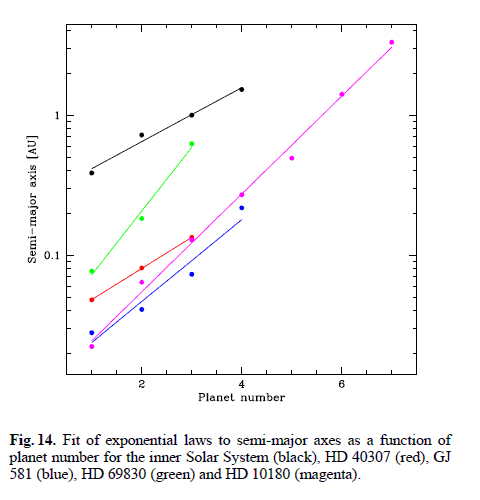
雅思免费课程NEW
剑桥题库机考HOT
雅思水平测试NEW
雅思选课中心
雅思听力
雅思口语
雅思阅读
雅思写作
雅思问答
雅思考试机经回忆
雅思动态NEW
雅思备考指导
雅思模拟题
雅思核心词汇NEW

雅思备考规划
扫码添加助教免费咨询雅思备考规划

扫码关注回复雅思获取最新雅思口语题库和备考资料
今天新东方在线小编给大家整理了雅思阅读素材积累:Bode's law lives!帮助大家更好的备考雅思阅读考试,更多雅思阅读素材内容,欢迎随时关注新东方在线雅思网。
SOMEWHERE, the spirit of Johann Elert Bode is smiling. Bode was a German astronomer who popularised a mathematical rule, which came to be known as Bode's law, in a book published in 1772. According to Bode's law, there is a hidden pattern in the spacing of the orbits of the planets. The orbits of Mercury, Venus, Earth, Mars, Jupiter and Saturn fit neatly into this pattern; Uranus, discovered in 1781, also obeyed the law. But there was a problem: Bode's law predicted that there ought to be a planet between Mars and Jupiter. It was only in 1801 with the discovery of Ceres, the largest of the asteroids, that this gap was neatly plugged.
In the two centuries since, however, Bode's law has fallen from grace. Ceres turned out to be just one of many asteroids orbiting between Mars and Jupiter, rather than a proper planet. Neptune, discovered in 1846, had a much smaller orbit than the law predicted; and Pluto, which is now classed as a "dwarf planet", also failed to fit in with Bode's neat pattern when it was found in 1930. Bode's law, it seemed, was just a coincidence, an example of the human mind's tendency to find a meaningful pattern where none exists.
But the discovery of a new planetary system by a group of astronomers at the European Southern Observatory, led by Christophe Lovis of the University of Geneva, has reawakened interest in the old rule. Indeed, their paper announcing the discovery refers to Bode's law by name (it actually calls it the Titius-Bode law, namechecking the Prussian astronomer whose idea Bode stole). The system consists of at least five, and possibly as many as seven, planets orbiting a sun-like star called HD 10180, located 127 light-years away in the constellation of Hydrus. As the planets orbit the star, they pull it to and fro, causing telltale wobbles in the star's light that can be detected from Earth. Careful analysis of these wobbles reveals the masses of the planets and the sizes and spacing of their orbits.
And it turns out that the spacing of the orbits of the planets around HD 10180 obey a version of Bode's law. The planets look very different from those in the Earth's solar system: five of them are about the size of Neptune, and are closer to their star than Mars is to the sun. The other two planets, for which the evidence is not quite so strong, are a Saturn-like planet orbiting further out, and a planet only slightly heavier than Earth orbiting very close to the star, so that it completes an orbit every 1.18 Earth days. But never mind that. The fit with Bode's law is striking, and the astronomers show in their paper that a few other known multiplanetary systems around other stars exhibit a similar fit too, though with fewer planets (see chart).

There is, in other words, starting to be enough evidence to suggest that Bode's law might not be a complete fluke. But why might planetary orbits obey such neat patterns, at least some of the time? The researchers speculate that it could be a side-effect of the mechanism by which planetary systems form. Dr Lovis and his colleagues suggest that when many planetary systems first emerge from a disk of dust and gas around a young star, they are "saturated" with planets. Most of the planets are then weeded out by collisions and ejections, caused by gravitational interaction between adjacent planetary bodies. Systems with regular planetary spacings then turn out to have the greatest long-term stability, so that they can be observed today. The researchers observe that "the orbital distances of successive planets with similar masses will tend to obey an approximate exponential law, much like the century-long debated and polemical Titius-Bode law in the Solar System."
There are several caveats, of course. "We emphasize that we do not consider these Titius-Bode-like 'laws' as having any other meaning than a possible signature of formation processes," the astronomers insist. Such laws may only apply to relatively small planets relatively close to their suns. Systems dominated by very large "super-Jupiter" planets are probably far more chaotic, with gravitational tussles causing planets to end up in all sorts of strange orbits. And Dr Lovis and his colleagues note that "the physics of planet formation is so diverse and complex that we do not expect any universal rule on planet ordering to exist."
Still, the idea that there might be something to Bode's law after all has been advanced by a few researchers in recent years as a serious theoretical possibility. As planet-finding technology improves, more planets are found around other stars and the number of known multiplanetary systems continues to increase, this modern-day revival of Bode's law can now be put to the test.
本文关键字: 雅思阅读素材

 资料下载
资料下载
雅思写作高频词汇PDF下载
发布时间:2023-08-26添加新东方在线雅思助教号
回复【200】获取
590组雅思阅读写作必背短语PDF版下载
发布时间:2023-08-09添加新东方在线雅思助教号
回复【590】获取
雅思学术词汇搭配表PDF版下载
发布时间:2023-08-04添加新东方在线雅思助教号
回复【ACL】获取
雅思口语part3结构策略PDF版下载
发布时间:2023-08-04添加新东方在线雅思助教号
回复【Part3】获取
雅思听力高频场景词PDF版下载
发布时间:2023-08-09添加新东方在线雅思助教号
回复【高频词】获取
雅思口语Part2答案示范15篇PDF下载
发布时间:2023-07-26添加新东方在线雅思助教号
回复【P2】获取
雅思小作文35组必备表达PDF下载
发布时间:2023-07-26添加新东方在线雅思助教号
回复【35】获取
雅思阅读高频短语PDF下载
发布时间:2023-07-20添加新东方在线雅思助教号
回复【短语】获取
200组雅思写作高频词汇PDF下载
发布时间:2023-07-20添加新东方在线雅思助教号
回复【200】获取
雅思写作话题词汇PDF下载
发布时间:2023-07-16添加新东方在线雅思助教号
回复【话题】获取
50组雅思口语同义替换词PDF下载
发布时间:2023-07-10添加新东方在线雅思助教号
回复【替换】获取
雅思写作大作文精选题目101PDF下载
发布时间:2023-07-09添加新东方在线雅思助教号
回复【101】获取
雅思口语核心300词PDF下载
发布时间:2023-06-23添加新东方在线雅思助教号
回复【300】获取
雅思阅读分类词汇PDF下载
发布时间:2023-06-17添加新东方在线雅思助教号
回复【分类词】获取
雅思口语必备习语PDF下载
发布时间:2023-06-17添加新东方在线雅思助教号
回复【习语】获取
雅思小作文常用词汇66词PDF下载
发布时间:2023-06-16添加新东方在线雅思助教号
回复【66】获取
雅思口语常见功能结构109句PDF下载
发布时间:2023-06-08添加新东方在线雅思助教号
回复【109】获取
10年雅思写作题库PDF下载
发布时间:2023-06-08添加新东方在线雅思助教号
回复【写作话题】获取
雅思图表作文精选套句50句PDF下载
发布时间:2023-05-28添加新东方在线雅思助教号
回复【50】获取
雅思写作99组高频词汇PDF资料
发布时间:2023-05-28添加新东方在线雅思助教号
回复【99】获取
2023年5月雅思口语新题题库PDF版本
发布时间:2023-05-14添加新东方在线雅思助教号
回复【新题】获取
2023年5-8月雅思口语新题题库与解析PDF版本
发布时间:2023-05-06关注新东方在线考雅课程中心服务号
回复【新题】获取
雅思听力考点词汇PDF资料
发布时间:2023-04-27添加新东方在线雅思助教号
回复【考点词】获取
雅思听力机经词汇PDF资料
发布时间:2023-04-24添加新东方在线雅思助教号
回复【TL】获取
雅思口语Part1常见话题语料库PDF资料
发布时间:2023-04-20添加新东方在线雅思助教号
回复【Part1】获取
剑桥雅思阅读长难句50句PDF资料
发布时间:2023-04-19添加新东方在线雅思助教号
回复【长难句】获取
雅思阅读核心学术词汇表PDF资料
发布时间:2023-04-07关注新东方在线考雅课程中心服务号
回复【核心】获取
100个雅思写作观点词和替换词表达PDF资料
发布时间:2023-03-24关注新东方在线考雅课程中心服务号
回复【100】获取
雅思阅读分类词汇PDF资料
发布时间:2023-03-22关注新东方在线考雅课程中心服务号
回复【分类词】获取
雅思阅读短语PDF资料
发布时间:2023-03-08关注新东方在线考雅课程中心服务号
回复【短语】获取

添加新东方在线雅思助教,
回复【口语】获取雅思口语资料大礼包

 推荐阅读
推荐阅读
在雅思阅读备考中,考生可以提前准备一些在考试场中可能会用到的应试技巧。接下来小编为大家分享雅思阅读临场经验和应试技巧,希望能为
来源 : 网络 2021-01-06 14:53:27 关键字 : 雅思阅读
在雅思阅读备考中,考生想要快速的取得进步,那么就需要结合一定的方法和技巧,往正确的方向努力。接下来小编为大家带来的是雅思阅读准
来源 : 网络 2021-01-06 14:52:33 关键字 : 雅思阅读
在雅思阅读备考中,填空题属于经典题型,但是这类题型也有一定难度,很多考生在这类题型上容易丢失分数。接下来小编给大家带来的是雅思
来源 : 网络 2021-01-05 14:32:45 关键字 : 雅思阅读
在雅思阅读考试中,考生可以通过一些实战技巧,帮助我们在考试中有一个更好的发挥。接下来小编为大家分享雅思阅读考试高分实战技巧,希
来源 : 网络 2021-01-05 14:31:40 关键字 : 雅思阅读
雅思阅读考试对考生来说有一定难度,很多考生在时间上出现问题,导致答不完题,时间不够用,其实这些情况我们都是可以改善的,那么如何
来源 : 网络 2021-01-04 15:09:13 关键字 : 雅思阅读





 资料下载
资料下载
添加新东方在线雅思助教号
回复【200】获取
添加新东方在线雅思助教号
回复【590】获取
添加新东方在线雅思助教号
回复【ACL】获取
添加新东方在线雅思助教号
回复【Part3】获取
添加新东方在线雅思助教号
回复【高频词】获取
添加新东方在线雅思助教号
回复【P2】获取
添加新东方在线雅思助教号
回复【35】获取
添加新东方在线雅思助教号
回复【短语】获取
添加新东方在线雅思助教号
回复【200】获取
添加新东方在线雅思助教号
回复【话题】获取
添加新东方在线雅思助教号
回复【替换】获取
添加新东方在线雅思助教号
回复【101】获取
添加新东方在线雅思助教号
回复【300】获取
添加新东方在线雅思助教号
回复【分类词】获取
添加新东方在线雅思助教号
回复【习语】获取
添加新东方在线雅思助教号
回复【66】获取
添加新东方在线雅思助教号
回复【109】获取
添加新东方在线雅思助教号
回复【写作话题】获取
添加新东方在线雅思助教号
回复【50】获取
添加新东方在线雅思助教号
回复【99】获取
添加新东方在线雅思助教号
回复【新题】获取
关注新东方在线考雅课程中心服务号
回复【新题】获取
添加新东方在线雅思助教号
回复【考点词】获取
添加新东方在线雅思助教号
回复【TL】获取
添加新东方在线雅思助教号
回复【Part1】获取
添加新东方在线雅思助教号
回复【长难句】获取
关注新东方在线考雅课程中心服务号
回复【核心】获取
关注新东方在线考雅课程中心服务号
回复【100】获取
关注新东方在线考雅课程中心服务号
回复【分类词】获取
关注新东方在线考雅课程中心服务号
回复【短语】获取

 编辑推荐
编辑推荐
 雅思新题
雅思新题
 阅读排行榜
阅读排行榜
 相关内容
相关内容